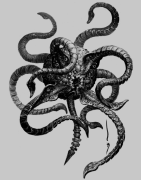|
physeter posted:Here's a picture of some Tuareg "Berbers" One of these people is not a traditional Berber but was part of a tribe that migrate to North Africa in the 15th century (North African history chat). If you want to know about what someone looked like in the Roman era in North Africa, go take a look a someone who is Coptic and still in Egypt. Historical trends say there has been very little outside of the community intermarriage since the 12th century (which is when Copts became a minority)
|
|
|
|

|
| # ? May 9, 2024 21:44 |
|
Mixoux posted:So I'm assuming the word 'vandalism' is derived from the Vandals, but what's the backstory behind that? Was it just propaganda that stuck throughout history? Not entirely, in the sense that they did wreak enormous damage on the Roman Empire. The Vandals were one of the Germanic tribes who followed the rest into Roman territory in the fifth century AD and, having fought and plundered their way across Gaul and Spain, crossed into North Africa and established a successful kingdom there. In 455 they sacked Rome itself, largely due to the Romans themselves being involved in a civil war and one side having asked the Vandals for help. The Vandal kingdom was eventually destroyed by Belisarius, the famous general of the Eastern Roman emperor Justinian, in the 520s AD, and the Vandals disappeared from history, either mixing in with the locals or with other Germanic tribes. They were clearly warlike, but I don't think you can fairly say they were more destructive than the other Germanic peoples, or, to be honest, the Romans themselves. Also, I think the term "vandal" for someone who destroys property for kicks developed much later. Not so much Roman propaganda as the creation of writers educated in classical history, perhaps.
|
|
|
|
As well as the words "gothic" and "teutonic". Outside of their literal sense that is.
|
|
|
|
Grand Fromage posted:but there were at least some probable Arabs and various other brands of white people who are not in any way ethnically Roman. I think his name was Elgabalus or something like that, the root word for mountain in arabic is Gabal or Jabal (which raises a question, did the romans have soft/hard G and did it matter?), Meteorites were considered sacred as a sign sent from heaven i'm not sure if this is specifically an arab thing or middle eastern, the kaaba in mecca houses the black stone for example. This also made me curious, how did the Romans view other latins? I'm working on memory here since i don't remember the book i read but some legions had "italian" or "latin" auxiliaries which were clearly mentioned to distinguish them from romans, what gives?
|
|
|
|
Fizzil posted:This also made me curious, how did the Romans view other latins? I'm working on memory here since i don't remember the book i read but some legions had "italian" or "latin" auxiliaries which were clearly mentioned to distinguish them from romans, what gives? That was before all Italians and Latins were given Roman citizenships after the Social War. Basically Romans still thought of them as dirty foreigners. Around 90 BC Roman Italy was still a collection of alliances different cities and tribes of the land under the supremacy of Rome. They weren't Romans. Romans were only the people of Rome, and nobody else. Only they had Roman citizenship and benefited from those rights. It's like if only the people of Philadelphia would enjoy complete rights in United States - and only if you were a true Philadelphian born of a Philadelphian. The situation was getting pretty ridiculous for several reasons: Rome already had a huge Mediterranean Empire. The people of this Empire outnumbered citizens to like 1000 to 1. Not really much of a sustainable situation in the long run, they had enough discontent without having all of Italy pissed off at them as well. Marian reforms had allowed the poor people of Rome to enlist in the Legions, but they still had to be Roman citizens. Meaning that the more populous Italian auxiliaries which fought in the Legionary style for the most part actually outnumbered the true Roman armies. All profits from the wars pretty much went to Rome and left rest of Italy poorer and poorer as their men fought in those wars and weren't around to farm. Italians started to be near indistinguishable from Romans, whether by virtue of language, general culture, etc. Conservative Romans nonetheless continued to view them like an U.S. conservative would view an illegal El Salvadoran. Terrible land distribution led into most of Italy being owned by Romans. Marcus Livius Drusus had lead a reform campaign to address Italian concerns but he was assassinated by conservatives. It was a final strike and this all culminated in a collective rebellion of Italian Allies. Italians had a very well trained force of 100,000 men (almost all of who had served in the Roman campaigns) and they were a real threat. They formed an independent nation called Italia after Roman style, electing two consuls and having a capital in Corfinium. That was a pretty great threat and it was coming from inside Italy, which meant that they had to call on Marius and Sulla to take de facto command and gently caress some poo poo up. Being Marius and Sulla they did gently caress poo poo up but it was obvious that the current situation wouldn't last and Rome's oldest and most bitter enemies Samnites swore to fight to the very end. So Senator Lucius Julius Caesar (relative to the better known one, although different branch) offered full citizenship to all Italian and Latin communities who had not rose up against Rome. It was followed by a second law that gave the citizenship to any male of an allied state (revolting or not) who would present himself to a praetor in 60 days. Everyone laid down their arms in a hurry to get a piece of that action and that was the Social War. After that there were no Latin or Italian auxiliaries. DarkCrawler fucked around with this message at 21:40 on Jul 4, 2012 |
|
|
|
Fizzil posted:(which raises a question, did the romans have soft/hard G and did it matter?) There's probably classicists present, but for a quick answer: - in reconstructions of Classical Latin, g is thought to represent exclusively the "hard" g, though gn and/or ng probably represented a velar nasal (English "sing"). - ecclesiastical pronunciation today follows Italian conventions in many ways, including for the letter g: it's a [dʒ] (English j, like in "Joe") before e, i or y, and hard otherwise. - in Vulgar Latin the sound developed into all sorts of directions, but generally lost the "hardness" before e and i: it went through [dʒ] to [ʒ] and today's [x] in Spanish, for example. I think it was the classical hard g in Vulgar Latin too originally, but palatalized over time.
|
|
|
|
Ras Het posted:There's probably classicists present, but for a quick answer: As an aside, we were generally taught to use a hard G when speaking Latin. It didn't apply so much to the hard C because 'Kikero' just sounds stupid, I guess.
|
|
|
|
Octy posted:As an aside, we were generally taught to use a hard G when speaking Latin. It didn't apply so much to the hard C because 'Kikero' just sounds stupid, I guess. The whole "hard" and "soft" c & g (and j) shebang is just an endless orthographical nuisance; the conventions in all major Romance languages and English have only a passing resemblance to the Classical Latin rules. For example, Finnish pronunciation rules are much closer to CL than those of Italian.
|
|
|
|
Octy posted:As an aside, we were generally taught to use a hard G when speaking Latin. It didn't apply so much to the hard C because 'Kikero' just sounds stupid, I guess. We learned hard c, hard g. I mean, no one says "Kikero" if they're speaking English, but if I were reading Latin aloud I would. I like to call him Kiki
|
|
|
|
Stormtrooper posted:Can you give some background on the state of the Roman empire during the late 14th century? How does it relate to the confederation (?) of German states known as the HRE? By the late 14th century, the Roman Empire consisted of Constantinople and whatever bits of land they could hold on to. The Fourth Crusade had broken whatever was left of their power and shattered the empire, they managed to recover somewhat but only a little. The Turks were slowly eating up what was left, and it was only a matter of time before the Ottomans finished the job. The empire was really pissed at Charlemagne for taking the title of Roman emperor and founding the HRE but that was about it. By the 1300s they had other problems and could not have given less of a poo poo what was going on in Germany. Hemp Knight posted:How did it change during that period? In particular, did they keep the classic legionary armour, weapons, and training, for example, or did they develop their own armour and adopt new weapons and tactics like the crossbow and perhaps even very early guns? The medieval Roman army changes a lot. They ditch the formal legion system in the 600s, but they maintain the same kind of training and discipline as ever and they have the most powerful military in Europe for centuries. They get a bad rap because of a lot of defeats and the eventual destruction by the Turks, but it was actually a very effective army, they just got gradually hosed by constantly being on the defense and beset on all sides. Their territory shrinks, their manpower shrinks, and it turns into a vicious cycle. The later Roman army comes to rely much more on cavalry, which is a big shift. This starts after the crisis of the third century, when the Romans begin to need much more border defense. It's a long-rear end border, so they start employing cavalry because of the speed and range it gives them. They form a quick reaction force that can go out and stop incursions; if the problem is serious, the cavalry can keep them busy until the nearest legions can arrive. This continues to evolve into the heavy cavalry of the medieval empire, the cataphracts. Another big change is once Greek fire is invented, they rely much more on the navy than the empire ever had previously. The Roman navy armed with Greek fire is essentially invincible, so they make an excellent defensive force. Also some soldiers get armed with grenades and flamethrowers. They adopt bows more widely than the earlier Romans ever had, I don't know if crossbows were ever used much. Guns were just coming into common use when the empire was conquered, so they never really got into that. I don't know much about specific organization or tactics. Evolved forms of the classical Roman styles, I'd guess.
|
|
|
|
Not equipment specific, but up till around the 11th century the Theme system in the eastern empire was definitely a change compared to the old Roman ways http://en.wikipedia.org/wiki/Theme_%28Byzantine_district%29 http://en.wikipedia.org/wiki/Byzantine_army#The_Themata Kind of like frontier militia almost. Men were given grants of land to support their families on but they would also be called up for battle when needed. The fact Constantinople, let alone the little bits of Greece they had beyond it, even remained in Roman hands into the 15th century is in itself almost a fluke, the empire could've fell decades before 1453, but they had some dumb luck, namely the Ottoman loss at the Battle of Ankara against Timur. Plus some shrewed diplomacy from John V, Manuel II and John VIII. But I mean they were already given into Ottoman demands and recognizing the sultans authority by the late 1380's-1390's under John V. At this point we can start the ever fun debate on when the Roman empire truly fell, I demand it be recognized as the late 14th century as by this point what was left of the Byzantine state was in many regards under Ottoman dominance. *edit* For someone who wants a read, when trying to find something I just came across this http://books.google.com/books?id=y2...zantium&f=false "The last centuries of Byzantium" Covers the empire from the retake of Constantinople by the Empire of Nicaea to its final fall to the Ottomans. Amused to Death fucked around with this message at 18:24 on Jul 5, 2012 |
|
|
|
Eggplant Wizard posted:We learned hard c, hard g. I mean, no one says "Kikero" if they're speaking English, but if I were reading Latin aloud I would. I like to call him Kiki Well, we did use hard C for most names and words, like Catullus and Cato, obviously. But even if my tutors didn't, I usually stuck to Kikero when reading and speaking so as to be consistent. I seem to recall we used the layman's pronunciation of Caesar too.
|
|
|
|
Alan Smithee posted:How much do we know about the Carthaginians anyway? Since Rome basically utterly destroyed them anything we would know would have to be documented by the people who hated them most The Romans didn't ethnically cleanse the Punics or deliberately burn their records or anything. It's just that over the slow-griding centuries the knowledge has been lost. It's like Claudius' history of the Etruscans, just not currently in the random grab bag of stuff that survived.
|
|
|
|
Octy posted:Well, we did use hard C for most names and words, like Catullus and Cato, obviously. But even if my tutors didn't, I usually stuck to Kikero when reading and speaking so as to be consistent. I seem to recall we used the layman's pronunciation of Caesar too. Is the Latin C = hard C more an American thing? I'm replaying Fallout New Vegas at the moment, and that uses the hard C for Ceasar, which sounds a bit odd since I'm used to the soft C from things like Gladiator and Rome.
|
|
|
|
Hemp Knight posted:Is the Latin C = hard C more an American thing? I'm replaying Fallout New Vegas at the moment, and that uses the hard C for Ceasar, which sounds a bit odd since I'm used to the soft C from things like Gladiator and Rome. The German Kaiser is closer to the correct pronounciation. English pronounciation has nothing to do with that, and Fallout New Vegas has nothing to do with either.
|
|
|
|
Hemp Knight posted:Is the Latin C = hard C more an American thing? I'm replaying Fallout New Vegas at the moment, and that uses the hard C for Ceasar, which sounds a bit odd since I'm used to the soft C from things like Gladiator and Rome. No, the pronunciation that the Legion uses in New Vegas is the classical Latin pronunciation. What we're used to is medieval church Latin. Kai-zar is the proper classical pronunciation of Caesar. See-zer is the ecclesiastical.
|
|
|
|
Grand Fromage posted:No, the pronunciation that the Legion uses in New Vegas is the classical Latin pronunciation. What we're used to is medieval church Latin. Kai-zar is the proper classical pronunciation of Caesar. See-zer is the ecclesiastical. Kai-sar technically isn't it, i.e. c->z isn't correct. Edit: not talking about how they pronounce it in New Vegas - I don't remember and they may very well be Evil, Bad and Wrong - so much as how Keekerow would have pronounced it  feedmegin fucked around with this message at 14:42 on Jul 5, 2012 |
|
|
|
Grand Fromage posted:No, the pronunciation that the Legion uses in New Vegas is the classical Latin pronunciation. What we're used to is medieval church Latin. Kai-zar is the proper classical pronunciation of Caesar. See-zer is the ecclesiastical. I was vaguely aware of this, but I didn't really think about the lingual implications into just now. It also means Cicero was pronounced "Kick-eh-row". feedmegin posted:Kai-sar technically isn't it, i.e. c->z isn't correct. KAJSAR Kaal fucked around with this message at 14:37 on Jul 5, 2012 |
|
|
|
feedmegin posted:Kai-sar technically isn't it, i.e. c->z isn't correct. Depends on your English accent I suppose. Sounds closer to a Z to me.
|
|
|
|
Kaal posted:It also means Cicero was pronounced "Kick-eh-row".
|
|
|
|
Morholt posted:Probably more like "Kick-eh-ro". Making every vocal into a diphtong is a very English thing. Technically speaking it would be kɪkɛro. But who's counting right?
|
|
|
|
Kaal posted:KAJSAR What's that mean, the proper pronunciation would have had a "J" sound in there? Or is it more like the whole Sovjet "more-y-than-j" sound?
|
|
|
|
TildeATH posted:What's that mean, the proper pronunciation would have had a "J" sound in there? Or is it more like the whole Sovjet "more-y-than-j" sound? The International Phonetic Alphabet's [j] is the y consonant in English "yes", so it's worth clarifying what you're referring to.
|
|
|
|
Ras Het posted:The International Phonetic Alphabet's [j] is the y consonant in English "yes", so it's worth clarifying what you're referring to. Yeah this. Really I'm just pulling your leg, since these types of phonetic disputes are pretty tricky to discuss entirely in writing, and usually come down to differences in pronunciation that incredibly minor. In all likelihood, citizens of Rome would have had unique accents anyway (just like New York City did prior to the rise of radio and television), and certainly Latin would have been pronounced differently outside of the city. Getting too fixated on a J vowel or an I vowel kind of misses the point.
|
|
|
|
How exactly do we know what Classical Latin pronunciation sounded like? Are there surviving Roman treatises on that sort of thing or is it guesswork?
|
|
|
|
Poetry is a good source.
|
|
|
|
Vincent Van Goatse posted:How exactly do we know what Classical Latin pronunciation sounded like? Are there surviving Roman treatises on that sort of thing or is it guesswork? Poetry, Latin grammar books correcting "mistakes", comparisons of phonological developments in Romance languages.
|
|
|
|
Grand Fromage posted:Depends on your English accent I suppose. Sounds closer to a Z to me. It shouldn't. The s in Latin doesn't z-ify (there's a real word for this but I forget it, shut up). Caesar in Classical pronunciation should be K-eye-ss-ahr I really need to learn the IPA. Anyway the conventional English pronunciations (See-zar for Caesar, Sisserow for Cicero, An-to-NINE-us for Antoninus...) are mostly from British English, which is how you get some of the crazy ones. British English really does weird things to foreign words, man. Vincent Van Goatse posted:How exactly do we know what Classical Latin pronunciation sounded like? Are there surviving Roman treatises on that sort of thing or is it guesswork? Linguistics involves a lot of complex stuff but here are some simpler things: - different spellings can tell you a lot, depending on what vowels people mix up etc. - poetic meter can tell you to some degree when word endings might have been dropped - Roman grammarians - Comparison with other languages in the Indo-European family and how Latin differs from its neighbors (Oscan or Umbrian, for example). - Sound change is apparently predictable much of the time  eta: Fun Caesar pronunciation fact. Lots of colonies (cities founded by Romans) were named Caesaria (K-eye-ss-ah-ree-ah). Guess what they turned into in English. Go on, guess! Nope, it's "Jersey" Eggplant Wizard fucked around with this message at 19:10 on Jul 5, 2012 |
|
|
|
So is this the WWII tank discussion of the Roman History thread?
|
|
|
|
Nah, I think the entire Roman military would be the WW2 battle tank equivalent since Rome is such a huge topic encompassing law, politics, culture, economics, literature, architecture, ah the list goes on, that has had an immeasurable effect even on today's world, but everyone is always like To be fair though a Roman legion is one of the most badass things in history ever.
|
|
|
|
Eggplant Wizard posted:eta: Fun Caesar pronunciation fact. Lots of colonies (cities founded by Romans) were named Caesaria (K-eye-ss-ah-ree-ah). Guess what they turned into in English. Is it really? I need to start a petition to get my state to rename itself New Caesarland.
|
|
|
|
This may have been asked already, but are there any good books I should check out with regard to an overall view of Roman history? Many books seem to focus on a particular era, but I'm not well versed in any of the detailed politics, so I'm looking for a nice overview that will give me plenty of detail as well. Any thoughts?
|
|
|
|
Third Murderer posted:Is it really? I need to start a petition to get my state to rename itself New Caesarland. Hmph, it should obviously be called Nova Caesaria.
|
|
|
|
As a former New Jersey resident I can confirm it is the worst place on Earth and I'm offended that there's a Roman connection to the name. For Latin questions I can highly recommend the Science, Academics, and Languages thread since that's full of people who speak it, and I do not.
|
|
|
|
Grand Fromage posted:As a former New Jersey resident I can confirm it is the worst place on Earth and I'm offended that there's a Roman connection to the name. For Latin questions I can highly recommend the Science, Academics, and Languages thread since that's full of people who speak it, and I do not. Well than we should go for neo ceaseria just to irk you more...
|
|
|
|
uinfuirudo posted:Well than we should go for neo ceaseria just to irk you more... I'm mostly offended when people can't spell Caesar. Or Israel. Or Libya. Or... (Also Neo is Greek.)
|
|
|
|
Cincinnati is also named after one of the first dictators of Rome (Cincinnatus, please correct my spelling if I got it wrong who famously gave up his power after his term was over) as a tribute to George Washington. Thanks to the History of Rome podcast for that bit of trivia.
|
|
|
|
Yeah, I'm from near there. There's a statue of Cincinnatus in one of the city parks.
|
|
|
|
How did Romans shave their faces?
|
|
|
|

|
| # ? May 9, 2024 21:44 |
|
isoprenaline posted:How did Romans shave their faces? Razors. Widespead use of razors is thousands of years of old.
|
|
|
































